Module 1 Unit 1 Let's try to speak English as much as possible. 课件(共22张PPT,内嵌音频)
文档属性
| 名称 | Module 1 Unit 1 Let's try to speak English as much as possible. 课件(共22张PPT,内嵌音频) | 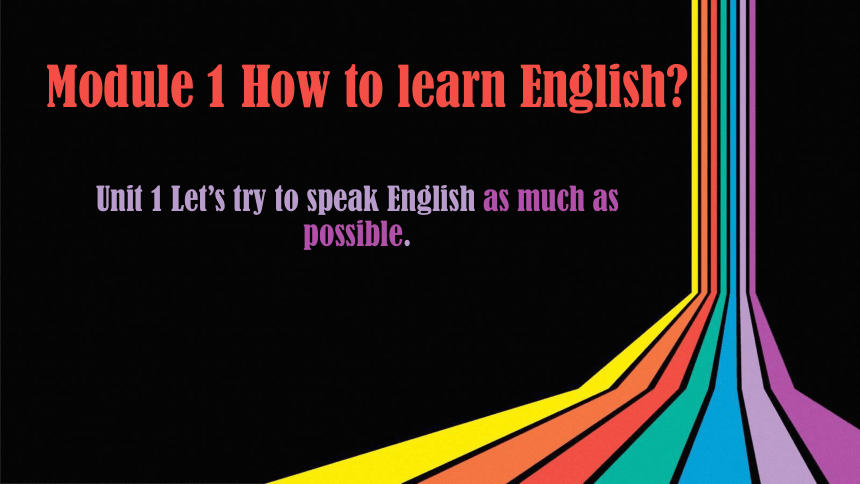 | |
| 格式 | zip | ||
| 文件大小 | 13.4MB | ||
| 资源类型 | 教案 | ||
| 版本资源 | 外研版 | ||
| 科目 | 英语 | ||
| 更新时间 | 2020-07-26 08:23:28 | ||
图片预览


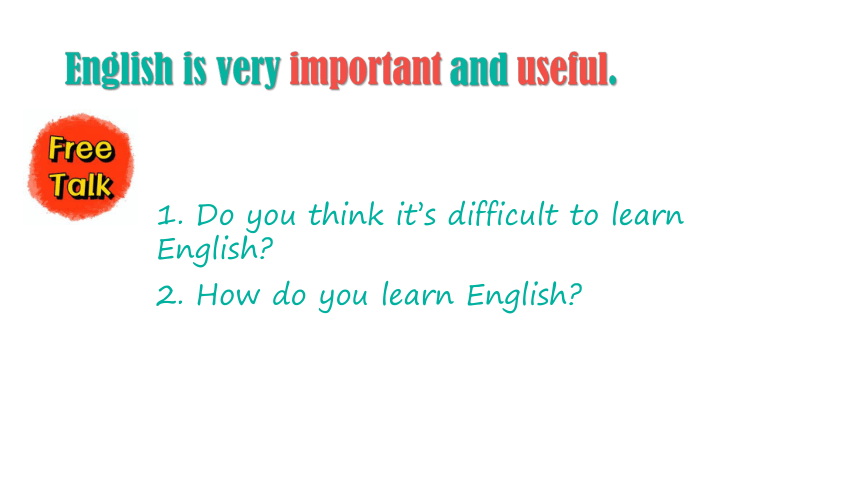
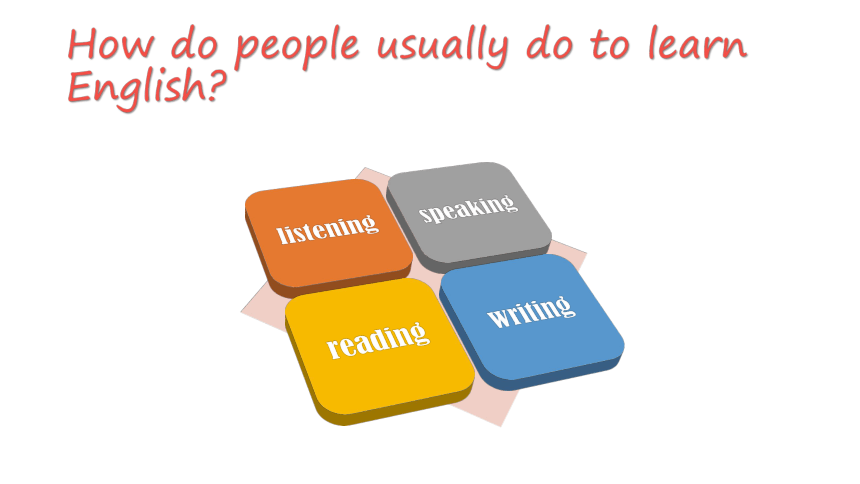
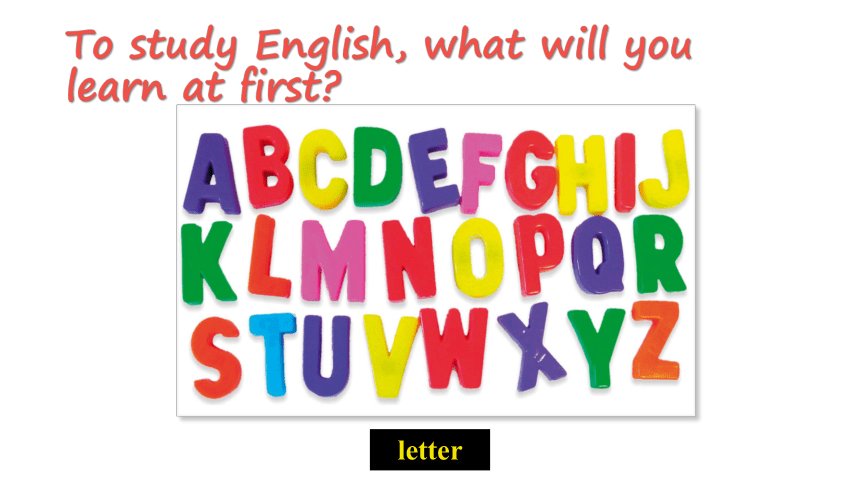
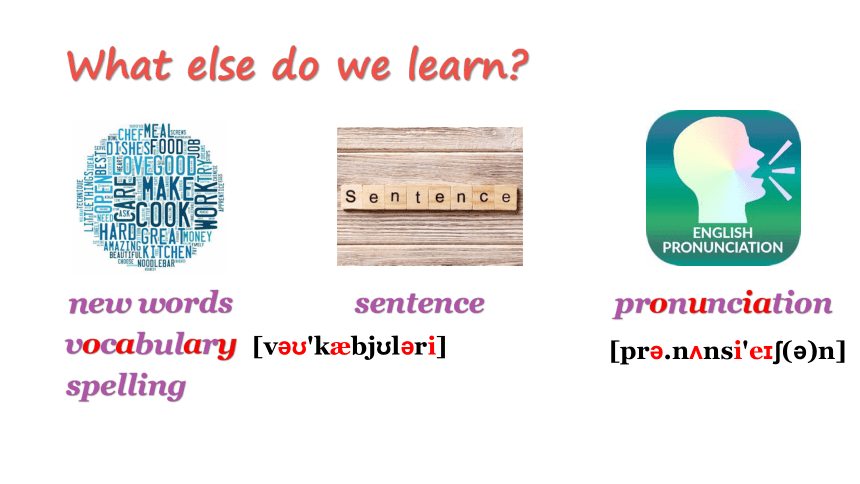
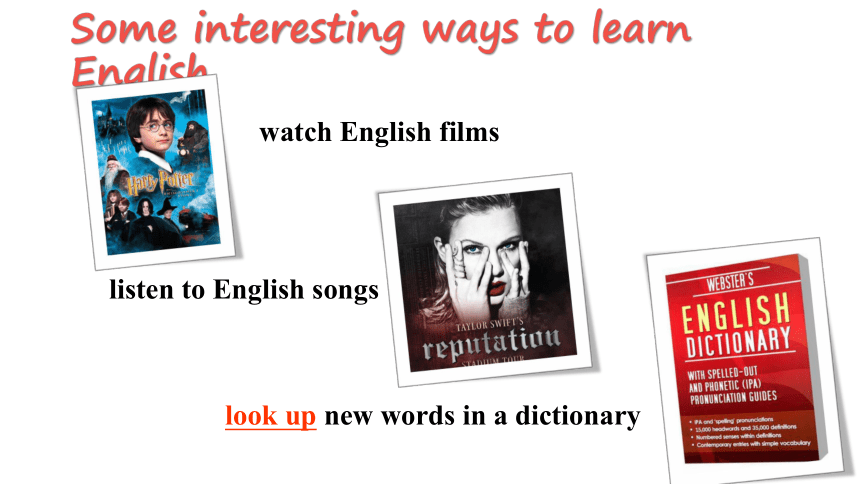
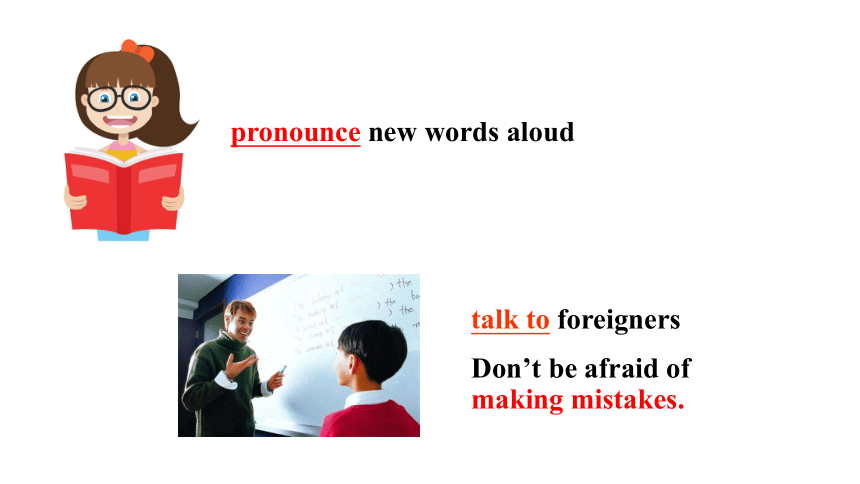
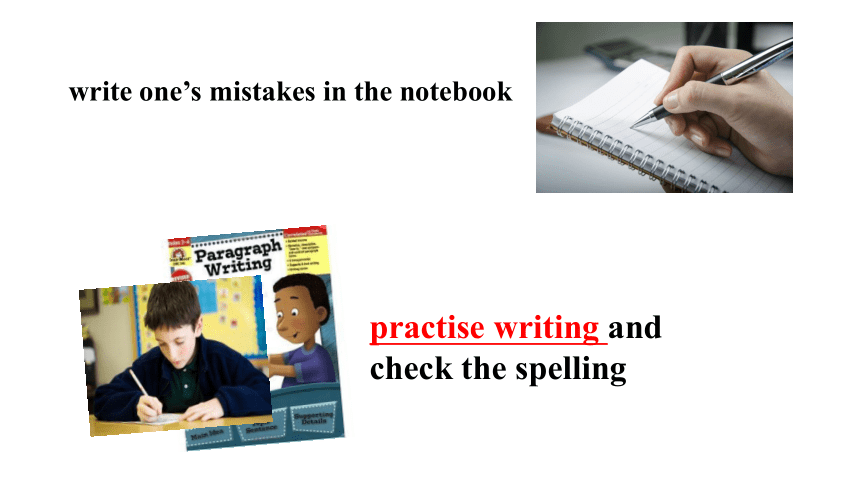
文档简介
(共22张PPT)
Unit
1
Let’s
try
to
speak
English
as
much
as
possible.
Module
1
How
to
learn
English?
Where
can
we
see
English
in
our
daily
life?
English
is
very
important
and
useful.
1.
Do
you
think
it’s
difficult
to
learn
English?
2.
How
do
you
learn
English?
How
do
people
usually
do
to
learn
English?
To
study
English,
what
will
you
learn
at
first?
letter
What
else
do
we
learn?
new
words
vocabulary
spelling
sentence
pronunciation
[v??'k?bj?l?ri]
[pr?.n?nsi'e??(?)n]
Some
interesting
ways
to
learn
English
watch
English
films
look
up
new
words
in
a
dictionary
listen
to
English
songs
pronounce
new
words
aloud
talk
to
foreigners
Don’t
be
afraid
of
making
mistakes.
practise
writing
and
check
the
spelling
write
one’s
mistakes
in
the
notebook
Listen
and
answer
the
questions.
Use
the
words
and
expressions
in
the
box.
dictionary
grammar
letter
look
up
make
a
mistake
understand
1.
Which
word
did
Daming
not
understand?
He
didn’t
understand
the
word
“spring”.
2.
What
mistake
did
Lingling
make?
3.
How
does
Daming
usually
check
the
spelling
of
a
word?
4.
Why
was
it
difficult
for
Daming
to
check
the
spelling
of
cinema?
She
made
a
grammar
mistake.
She
said
“go”
instead
of
“went”.
He
looks
it
up
in
the
dictionary.
Because
he
didn’t
know
the
first
letter.
Activity
3:Watch
a
flash
and
answer
the
questions
What
are
they
doing?
What
are
they
talking
about?
Do
you
have
to
understand
every
word
when
listening
to
the
radio?
They
are
having
an
English
class/lesson.
They
are
talking
about
how
to
learn
English.
No,
you
just
need
to
listen
for
key
words
And
main
ideas.
Listen
to
the
dialogue
and
find
the
to
learn
English
[?d'va?s]
Now
write
notes
about
learning
English.
Listening:
listen
to
the
radio
Speaking:
Reading:
Writing:
Learning
new
words:
speak
English
as
much
as
possible
read
English
stories
write
to
English
pen
friends
spell
and
pronounce
new
words
aloud
every
day.
How
to
learn
English
well?
Please
find
out
some
advice
on
learning
English.
We
should
always
speak
English
in
class.
(Line
3)
Let’s
try
to
speak
English
as
much
as
possible.
(Line
4)
Why
not
write
down
the
mistakes
in
our
notebooks?
(Line
5)
Don’t
forget
to
write
down
the
correct
answers
next
to
the
mistakes.
(Line
6)
It’s
a
good
idea
to
spell
and
pronounce
new
words
aloud
every
day.
(Line
8)
How
about
listening
to
the
radio?
(Line
9)
Why
don’t
we
try
to
find
some
English
pen
friends?
(Line
16)
表示提建议的句型有:
How/What
about
…
?
Let’s
…
Why
don’t
you…?
Why
not…?
You
should/shouldn't
…
It's
a
good
idea
to
do.....
doing
sth.
do
sth.
常用的回答是:
That’s
a
good/great
idea./OK./
All
right.
I
run
out
of
my
toothpaste.
______
go
to
the
supermarket?
Why
not
I
don’t
know
the
way.
__________
following
me?
How
about
I’m
feeling
bad,
baby.
You
_______
see
a
doctor.
should
Let’s
go
for
a
picnic!
It’s
hot
outside.
________
we
go
to
the
cinema?
Why
don’t
Give
some
advice
to
learn
English
1):Why
don’t
you
do
…?
2):You
should
do…
3):How/What
about
doing
…?
4):
It’s
a
good
idea
to
do
…
watch
English
films
listen
to
English
songs
look
up
new
words
in
a
dictionary
talk
to
foreigners
practice
writing
read
English
books
read
English
newspapers
Many
students
think
that
learning
English
is
difficult.
But
different
students
have
different
problems.
Pair
work
Task
You
talk
with
your
friend
and
he/she
is
upset
about
English
learning.
You
need
to
give
him/her
advice
to
help
him/her
solve
the
problems.
You
also
need
to
speak
out
your
problem
and
ask
for
help.
Characters:
Student
A
&
B
Situation:
during
the
break
A:
________,
why
are
you
so
upset?
B:
Hi,
________.
I
have
some
problems
of
learning
English.
A:
So
do
I.
But
I
think
we
have
different
problems,
maybe
we
can
help
each
other.
B:
Yes,
you
are
right!
I
can’t
…
A:
It’s
a
good
idea
to
…
As
for
me,
I
don’t
know…
B:
I
think
you
should…
But
I
still
have
some
difficulty
in
…
A:
All
right.
Why
don’t
you…
B:
Thanks
for
your
advice,
I
think
I
can
do
it
better
in
English.
A:
You
are
welcome.
You
also
give
me
some
useful
advice,
and
it’s
very
helpful.
Problems
I
can’t…
I
don’t
know…
Advice
How/What
about…?
Why
don’t
you/not…?
Unit
1
Let’s
try
to
speak
English
as
much
as
possible.
Module
1
How
to
learn
English?
Where
can
we
see
English
in
our
daily
life?
English
is
very
important
and
useful.
1.
Do
you
think
it’s
difficult
to
learn
English?
2.
How
do
you
learn
English?
How
do
people
usually
do
to
learn
English?
To
study
English,
what
will
you
learn
at
first?
letter
What
else
do
we
learn?
new
words
vocabulary
spelling
sentence
pronunciation
[v??'k?bj?l?ri]
[pr?.n?nsi'e??(?)n]
Some
interesting
ways
to
learn
English
watch
English
films
look
up
new
words
in
a
dictionary
listen
to
English
songs
pronounce
new
words
aloud
talk
to
foreigners
Don’t
be
afraid
of
making
mistakes.
practise
writing
and
check
the
spelling
write
one’s
mistakes
in
the
notebook
Listen
and
answer
the
questions.
Use
the
words
and
expressions
in
the
box.
dictionary
grammar
letter
look
up
make
a
mistake
understand
1.
Which
word
did
Daming
not
understand?
He
didn’t
understand
the
word
“spring”.
2.
What
mistake
did
Lingling
make?
3.
How
does
Daming
usually
check
the
spelling
of
a
word?
4.
Why
was
it
difficult
for
Daming
to
check
the
spelling
of
cinema?
She
made
a
grammar
mistake.
She
said
“go”
instead
of
“went”.
He
looks
it
up
in
the
dictionary.
Because
he
didn’t
know
the
first
letter.
Activity
3:Watch
a
flash
and
answer
the
questions
What
are
they
doing?
What
are
they
talking
about?
Do
you
have
to
understand
every
word
when
listening
to
the
radio?
They
are
having
an
English
class/lesson.
They
are
talking
about
how
to
learn
English.
No,
you
just
need
to
listen
for
key
words
And
main
ideas.
Listen
to
the
dialogue
and
find
the
to
learn
English
[?d'va?s]
Now
write
notes
about
learning
English.
Listening:
listen
to
the
radio
Speaking:
Reading:
Writing:
Learning
new
words:
speak
English
as
much
as
possible
read
English
stories
write
to
English
pen
friends
spell
and
pronounce
new
words
aloud
every
day.
How
to
learn
English
well?
Please
find
out
some
advice
on
learning
English.
We
should
always
speak
English
in
class.
(Line
3)
Let’s
try
to
speak
English
as
much
as
possible.
(Line
4)
Why
not
write
down
the
mistakes
in
our
notebooks?
(Line
5)
Don’t
forget
to
write
down
the
correct
answers
next
to
the
mistakes.
(Line
6)
It’s
a
good
idea
to
spell
and
pronounce
new
words
aloud
every
day.
(Line
8)
How
about
listening
to
the
radio?
(Line
9)
Why
don’t
we
try
to
find
some
English
pen
friends?
(Line
16)
表示提建议的句型有:
How/What
about
…
?
Let’s
…
Why
don’t
you…?
Why
not…?
You
should/shouldn't
…
It's
a
good
idea
to
do.....
doing
sth.
do
sth.
常用的回答是:
That’s
a
good/great
idea./OK./
All
right.
I
run
out
of
my
toothpaste.
______
go
to
the
supermarket?
Why
not
I
don’t
know
the
way.
__________
following
me?
How
about
I’m
feeling
bad,
baby.
You
_______
see
a
doctor.
should
Let’s
go
for
a
picnic!
It’s
hot
outside.
________
we
go
to
the
cinema?
Why
don’t
Give
some
advice
to
learn
English
1):Why
don’t
you
do
…?
2):You
should
do…
3):How/What
about
doing
…?
4):
It’s
a
good
idea
to
do
…
watch
English
films
listen
to
English
songs
look
up
new
words
in
a
dictionary
talk
to
foreigners
practice
writing
read
English
books
read
English
newspapers
Many
students
think
that
learning
English
is
difficult.
But
different
students
have
different
problems.
Pair
work
Task
You
talk
with
your
friend
and
he/she
is
upset
about
English
learning.
You
need
to
give
him/her
advice
to
help
him/her
solve
the
problems.
You
also
need
to
speak
out
your
problem
and
ask
for
help.
Characters:
Student
A
&
B
Situation:
during
the
break
A:
________,
why
are
you
so
upset?
B:
Hi,
________.
I
have
some
problems
of
learning
English.
A:
So
do
I.
But
I
think
we
have
different
problems,
maybe
we
can
help
each
other.
B:
Yes,
you
are
right!
I
can’t
…
A:
It’s
a
good
idea
to
…
As
for
me,
I
don’t
know…
B:
I
think
you
should…
But
I
still
have
some
difficulty
in
…
A:
All
right.
Why
don’t
you…
B:
Thanks
for
your
advice,
I
think
I
can
do
it
better
in
English.
A:
You
are
welcome.
You
also
give
me
some
useful
advice,
and
it’s
very
helpful.
Problems
I
can’t…
I
don’t
know…
Advice
How/What
about…?
Why
don’t
you/not…?
同课章节目录
- Module 1 How to learn English
- Unit 1 Let's try to speak English as much as possi
- Unit 2 You should smile at her.
- Unit 3 Language in use .
- Module 2 My home town and my country
- Unit 1 It's taller than many other buildings.
- Unit 2 Cambridge is a beautiful city in the east o
- Unit 3 Language in use .
- Module 3 Sports.
- Unit 1 Nothing is more exciting than playing tenni
- Unit 2 This year we training more carefully.
- Unit 3 Language in use .
- Module 4 Planes, ships and trains .
- Unit 1 He lives the farthest from school.
- Unit 2 What is the best way to travel.
- Unit 3 Language in use .
- Module 5 Lao She Teahouse.
- Unit 1 I wanted to see the Beijing Opera.
- Unit 2 It descibes the changes in Chinese society.
- Unit 3 Language in use .
- Module 6 Animals in danger.
- Unit 1 It allows people to get closer to them .
- Unit 2 The WWF is working hard to save them all.
- Unit 3 Language in use .
- Revision module A
- Module 7 A famous story
- Unit 1 Alice was sitting with her sister by the ri
- Unit 2 She was thinking about her cat.
- Unit 3 Language in use .
- Module 8 Accidents
- Unit 1 While the car were changing to red, a car s
- Unit 2 I was trying to pick it up when it bite me
- Unit 3 Language in use .
- Module 9 Population
- Unit 1 The population of China is about 1.37 billi
- Unit 2 Arnwick was a city with 200,000 people.
- Unit 3 Language in use .
- Module 10 The weathe
- Unit 1 It might snow.
- Unit 2 The weather is fine all year round.
- Unit 3 Language in use .
- Module 11 Way of life
- Unit 1 In China ,we open a gift later.
- Unit 2 In England, you usually drink tea with milk
- Unit 3 Language in use .
- Module 12 Help
- Unit 1 What should we do before help arrives?
- Unit 2 Stay away from windows and heavy furniture.
- Unit 3 Language in use .
- Revision module B
